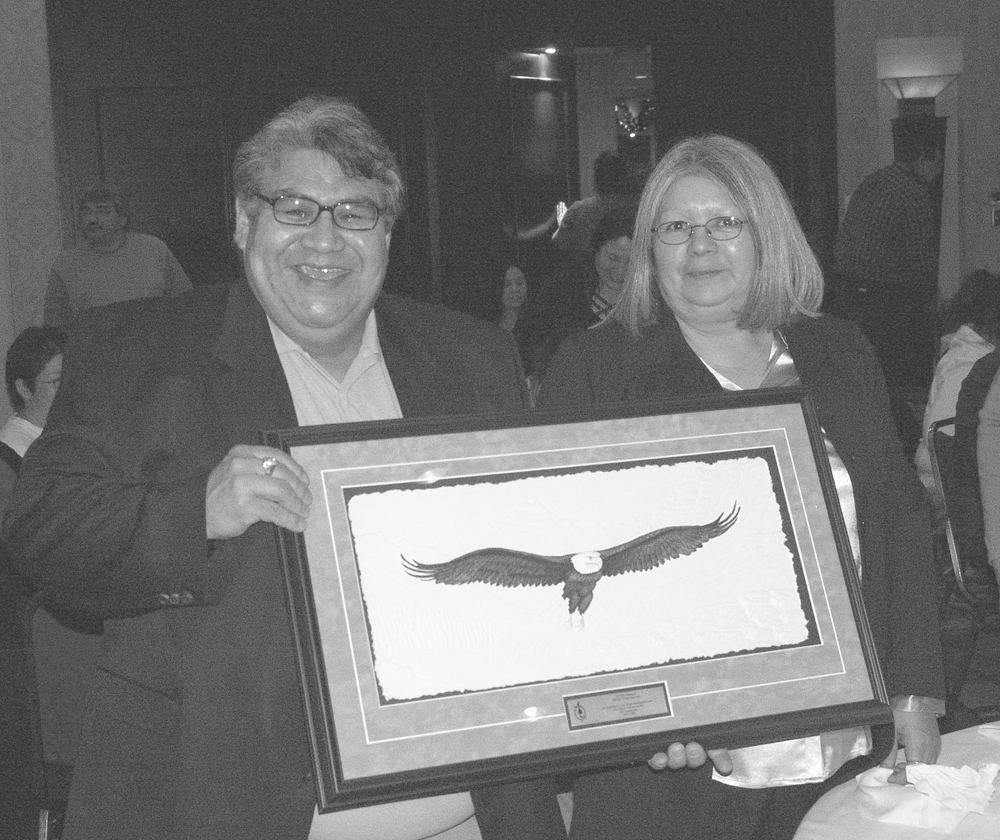
The Grand Council of the Crees used their annual Christmas dinner in Montreal December 14 to celebrate the 30th anniversary of the James Bay and Northern Quebec Agreement with a special tribute to the chief negotiators of the agreement.
Recently elected Grand Chief Matthew Mukash delivered a speech that marked the contributions of Ted Moses, Billy Diamond, Philip Awashish and Robert Kanatewat.
“It is important that we reflect on the role and importance of the James Bay and Northern Quebec Agreement in respect to the Eeyou/Eenou rights it recognizes and protects – lest we take those rights for granted,” said Mukash to the roughly 200 people attending the dinner. About the chief negotiators, Mukash added, “so many things can be said. They were fearless and bold. We can see the results of their work today.”
Putting aside the political acrimony of a hotly contested election last summer, Mukash noted that leading the Grand Council is not an easy job.
“I am only three months into my work as Grand Chief,” he said. “And I have developed a great respect for former Grand Chiefs – Billy Diamond, Ted Moses, and Matthew Coon Come. Tonight is a recognition of those who helped build our nation and their influence on the direction our nation is heading in.”
The JBNQA was signed November 11, 1975 after a four-year battle over the James Bay Hydroelectric Development Project – former premier Robert Bourassa’s “project of the century.” Other signatories (aside from the four mentioned above) included Fred Blackned, Matthew Shanush, Peter Gull, Smally Petawabano, Joseph Petagamaskum, Bertie Wapachee, Abel Kitchen, Walter Hughboy and Josie Sam Atkinson.
As Billy Diamond noted in his address, there was a new generation of Crees in the early 1970s who came to the forefront insisting on their rights in Quebec and in Canada.
“My father told me to take the white man’s law and beat him with it,” said Diamond. In 1972, with the Malouf decision saying the Quebec government had to negotiate with the Crees, that’s exactly what those early leaders did. And with the signing of the JBNQA, Diamond said, “We proved we can change history.”
Diamond also paid tribute to the chiefs who were on the frontlines of the long battle to obtain the JBNQA, and emphasized the importance of family on the eve of the holiday season. “These are the lessons I cherish,” Diamond said. “We always managed to get home for Christmas. Sometimes on the last flight on Christmas Eve, but we always made it home to stay together as family.”
The change continues, he noted, as the torch is being passed to a younger generation of leaders. “We are changing as a society. We are an evolving society. And there is much more to do.”
The JBNQA was won because someone had a dream, Diamond observed. “Our people had a vision. A people without a vision will perish. You must pursue that vision with a passion, because you can change history.”
Levity during the evening was provided by AirCreebec President Albert Diamond, who worked the room as emcee.
In the old days, Albert Diamond observed, “we would feast at 7:30 pm. The drinking party would start at 10:30. Then we would go to a dance at midnight and dance till sunrise. That’s what we’re going to try to do tonight.”
Noting the unexpected absence of former Grand Chief Ted Moses, Diamond quipped, “In a way I was glad Ted couldn’t make it… that’s all we need: more speeches!”
Diamond warmed up the crowd with a more knee-slappers, including the following:
“A Québécois wanted to go goose hunting at Chisasibi, but it was explained to him that he could only hunt on category 3 lands,” Diamond recounted. “So he goes hunting and shoots a goose, but it fell on to category 2 land.
“There’s an old Cree hunter there, and he says to the man, ‘You can’t touch that goose, it’s on category 2 land.’ Well, the Québécois hunter happens to be a lawyer, and he threatens to take the old Cree to court.
“The old Cree suggests to the man that, ‘We settle this in the Cree way, with the three-kick rule. We kick each other three times until one of us gives up.’
“The lawyer agrees, and the old Cree goes first. He winds up and kicks him in the groin. Then when he’s on the ground he kicks again in the stomach. And then in the butt.
“The Quebecois gets up off the ground and says, ‘Okay, it’s my turn.’ But the old Cree guy says, ‘That’s okay. I give up, you can have the goose!’”
While the story is just a joke, the anniversary of the signing of the JBNQA shows there is a little truth in it as well.

